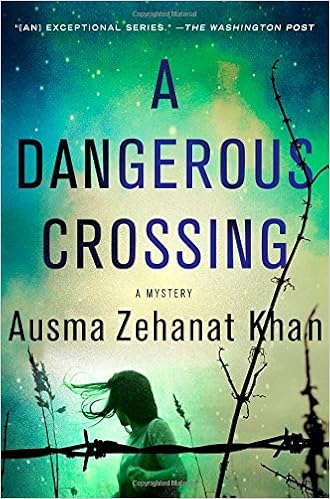What do y’all think it says about the year we’ve been having me that I glanced at Ausma Zehanat Khan’s bio on the back flap of A Dangerous Crossing, saw that she has her Ph.D. in international human rights law, and thought “gosh I wish she’d write some novel-length post-CACW Avengers fanfic”?

Um, but anyway, this is the fourth book in her Esa Khattak / Rachel Getty series about a Canadian police inspector and his right-hand woman, who are always investigating crimes to do with human rights violations. A Dangerous Crossing sees Esa and Rachel headed to Greece in search of Esa’s friend Nathan’s sister, who has been working for a humanitarian organization trying to help Syrian refugees find homes in Canada. A young refugee and a French Interpol agent were recently found dead on the island of Lesvos; Audrey’s gun is the murder weapon, but Audrey herself has disappeared.

Though I read books more to experience stories than to learn something, the books in this series invariably teach me a lot — both in and of themselves, and by opening up new avenues of interest. For example, Esa and Rachel travel to an island where many boatfuls of Syrian refugees have washed up and settled in camps as they try to find permanent homes. So far, so familiar: I knew camps like this existed. Khan brings them to vivid life, the many perils refugees have faced and the many they will continue to face in the camps and the journeys onward. She explores with compassion the refugees’ fear and helplessness, as well as the frustration of the native Greeks at being the front line of a refugee crisis on an unprecedented scale.
But Khan explores more than those basics. I learned that an organization called the Commission for International Justice and Accountability has been collating evidence of war crimes by the Assad regime for years. They depend on leakers — one former Syrian military officer with the pseudonym Caesar smuggled out thousands of photographs cataloging torture of prisoners — as well as staff members actively pursuing relevant documents pertaining to Syrian war crimes.
I know that I’ve said very little about the actual plot of A Dangerous Crossing. But truly, what I love about Ausma Zehanat Khan is that she weaves plot points seamlessly into her worldbuilding — can I say worldbuilding, when it’s real life? We learn about the leaks, or the work of the NGOs, or the epidemic of child trafficking, because the characters do, as they try to find out who killed these two people and what happened to Audrey. It’s a twisty, fascinating mystery in a setting that reminds the reader of the tragedies taking place on on our countries’ doorsteps.